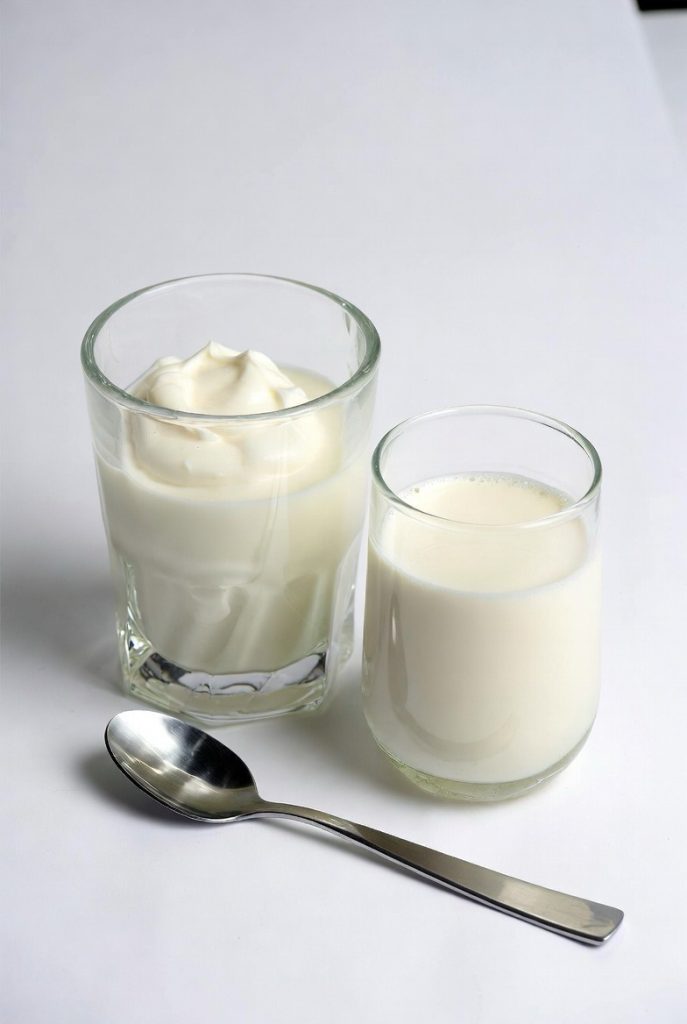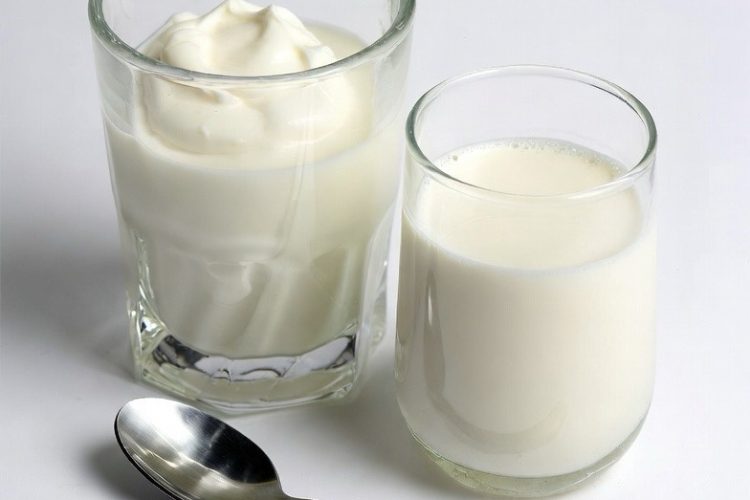Kefir and yogurt are both fermented dairy foods packed with probiotics for gut health, but they differ in ways that matter. Yogurt uses two main bacteria (Lactobacillus bulgaricus, Streptococcus thermophilus) and has a thick, creamy texture. Kefir ferments with kefir grains—a mix of up to 61 bacteria and yeasts—making it fizzy, drinkable, and more probiotic-diverse.
Nutritionally, kefir offers more vitamin A, calcium, and potassium; yogurt (especially Greek) wins on protein. Kefir aids lactose tolerance better, supports immunity, lowers cholesterol, and fights inflammation more strongly. Yogurt helps with digestion, allergies, and muscle repair.
Taste-wise, yogurt is mildly tangy and spoonable; kefir is sharper and effervescent. Both boost microbiome health, but kefir often edges out for deeper gut and immune benefits. Choose kefir for max probiotics, yogurt for protein and ease. Start slow if new to fermented foods.
Long Version
In the world of fermented dairy products, kefir and yogurt stand out as popular choices for those seeking to enhance their gut health through probiotics and live cultures. Both are forms of cultured milk that undergo a fermentation process, transforming them into functional foods rich in beneficial bacteria and yeast. However, when it comes to a nutrition comparison, understanding their differences in health benefits, digestion support, immunity boosting, and overall impact on the microbiome can help determine which might be better suited to your needs. This article delves into every aspect of these dairy products, from their production to specific effects like antioxidant activity and weight control, providing a complete resource based on scientific insights.
Understanding the Basics: Production and Fermentation Process
Yogurt is typically made by fermenting milk with thermophilic starter cultures, primarily Lactobacillus bulgaricus and Streptococcus thermophilus. These bacteria convert lactose into lactic acid, giving yogurt its thick, spoonable consistency and tangy, sour taste. The process occurs at higher temperatures, around 110°F, and results in a product that often contains billions of CFUs (colony-forming units) of viable microorganisms.
Kefir, on the other hand, originates from kefir grains—a symbiotic culture of bacteria and yeast that resembles cauliflower florets. It uses mesophilic starter cultures, fermenting at room temperature. This process involves a broader array of microorganisms, including Lactobacillus kefiranofaciens, Lactococcus lactis, Leuconostoc species, and Saccharomyces species, alongside bacteria like those in yogurt. The fermentation produces not only lactic acid but also carbon dioxide and a small amount of ethanol, making kefir effervescent and fizzy with a thinner, more liquid, drinkable consistency compared to yogurt’s tart, thick texture. This diversity contributes to kefir’s reputation as a more complex fermented dairy option, allowing for a wider range of microbial interactions that can influence flavor and health properties more dynamically.
Nutritional Comparison: Macros, Vitamins, and Minerals
When comparing the nutritional profiles of kefir and yogurt, both offer substantial value as dairy products, but subtle differences emerge that can align with specific dietary preferences. A standard serving of plain, low-fat kefir (about 1 cup) typically contains around 100-110 calories, 9-11 grams of protein, 2-3 grams of fat, and 12 grams of carbs, with natural sugars from lactose. It stands out for higher levels of vitamin A, folate, calcium, potassium, manganese, copper, and sodium, supporting functions like bone health, electrolyte balance, and even vision support through vitamin A’s role in eye health.
Plain Greek yogurt, often strained for a denser texture, provides similar calories but excels in protein (up to 20 grams per cup in nonfat varieties) and offers more vitamins B2, B6, and B3, which aid in energy metabolism, red blood cell production, and nerve function. Yogurt may have slightly fewer carbs and fats, making it a go-to for those monitoring overweight or obesity risks or following low-carb diets. Both contribute to hydration due to their water content, but kefir’s liquid form might make it easier to consume in larger quantities for this purpose, potentially aiding in daily fluid intake goals. Overall, neither is vastly superior nutritionally, but choices depend on specific dietary goals, such as higher probiotic intake versus protein focus. For instance, athletes might lean toward yogurt for muscle repair, while those focused on mineral-rich hydration could prefer kefir.
Probiotic Power: Bacteria, Yeast, and Microbiome Support
The core appeal of both kefir and yogurt lies in their probiotics—live microorganisms that promote gut health by balancing the microbiome. Yogurt primarily features two to three bacterial strains, delivering antimicrobial effects against pathogens and aiding lactose tolerance for those with mild intolerance. It helps alleviate chronic digestive inflammation and leaky gut syndrome by supporting the intestinal barrier, potentially reducing permeability issues that lead to broader health concerns.
Kefir takes this further with up to 61 strains of bacteria and yeasts, often boasting higher CFUs—sometimes billions more per serving. This diversity enhances its symbiotic culture benefits, including stronger anti-inflammatory effects and better modulation of the gut flora. Kefir’s yeasts, like Saccharomyces, contribute to its fizzy nature while providing additional protection against harmful bacteria. For instance, kefir can combat common pathogens like E. coli and salmonella more effectively, bolstering immunity and reducing infection risks. This makes kefir particularly potent for microbiome diversity, as regular consumption can increase beneficial microbes and lower inflammation markers, fostering a more resilient gut environment that supports long-term health.
Health Benefits: From Digestion to Disease Prevention
Both kefir and yogurt excel in supporting digestion, thanks to their probiotic content. They reduce symptoms like bloating and flatulence, with notable improvements in lactose-related issues for many consumers. Kefir’s broader microbial profile may offer superior relief for conditions like leaky gut syndrome and chronic digestive inflammation, while yogurt’s consistency aids in steady nutrient absorption and can be easier on sensitive stomachs due to its milder fermentation.
On immunity, kefir’s yeasts and bacteria provide robust support, enhancing antioxidant activity to combat oxidative stress and free radicals that contribute to aging and disease. It has demonstrated hypocholesterolaemic effects (lowering cholesterol), anti-hypertensive effects (blood pressure regulation), and anti-carcinogenic activity, potentially reducing colon cancer risk through pathogen inhibition and cellular protection mechanisms. Yogurt shares anti-inflammatory effects and anti-allergenic activity, helping with allergies and asthma by modulating immune responses, but kefir’s diversity often yields stronger outcomes in promoting overall resilience.
For weight control, both can aid in managing overweight or obesity by promoting satiety and regulating metabolism through their protein and fiber-like effects from fermentation byproducts. Kefir’s lower sugar content (due to more thorough fermentation) and probiotic richness may edge it out for blood sugar control, improving insulin sensitivity and helping stabilize energy levels throughout the day. Yogurt, especially Greek varieties, supports muscle maintenance with higher protein, making it ideal for active lifestyles or those building lean mass. Additionally, both may influence the gut-brain axis, potentially enhancing mood and reducing stress-related eating patterns.
Additional benefits include kefir’s historical use for conditions like tuberculosis and gastrointestinal disorders, backed by its antimicrobial effects that extend to broader pathogen control. Both contribute to overall well-being, but kefir’s effervescent quality and trace ethanol add a unique twist, possibly offering mild relaxation benefits without significant alcohol content.
Taste, Consistency, and Practical Considerations
Yogurt’s tangy, sour, tart flavor and thick, spoonable texture make it versatile for meals, snacks, or recipes like smoothies, dressings, or even baked goods where its creaminess shines. Kefir’s fizzy, effervescent profile and liquid, drinkable consistency suit it for beverages, pouring over cereals, or blending into shakes, though its stronger sourness might require acclimation or sweetening with fruits for beginners.
When choosing, consider lactose tolerance—both improve it by breaking down lactose, but kefir ferments more away, making it often better for those with higher sensitivity. Look for products with viable live cultures to ensure maximum benefits. Kefir grains allow home fermentation, offering cost savings, customization, and the ability to control freshness, while yogurt uses simpler starters that are more accessible for quick homemade batches. Storage-wise, both last about a week in the fridge, but kefir’s carbonation might require occasional venting to prevent buildup.
Potential Downsides and Precautions
Neither is without caveats. Those with dairy allergies or severe lactose intolerance should opt for non-dairy alternatives made from almond, coconut, or oat bases. Kefir’s yeast and trace ethanol (under 1%) might cause mild reactions like bloating in sensitive individuals, and its higher sodium could concern those managing hypertension. Yogurt’s additives in flavored versions can add sugars or artificial ingredients, undermining natural benefits and potentially spiking blood sugar. Start with small amounts to assess tolerance, especially for gut health novices, and monitor for any probiotic overload symptoms like temporary digestive upset. Pregnant individuals or those with compromised immunity should consult professionals before increasing intake.
Which Is Better: Kefir or Yogurt?
Ultimately, kefir often edges out as healthier for gut health due to its wider probiotic array, higher CFUs, and yeasts, making it superior for digestion, immunity, and anti-inflammatory effects in many scenarios. However, yogurt shines for protein-focused diets, milder taste preferences, and easier integration into solid meals. Both are excellent functional foods; incorporating either—or both—can enhance your microbiome and overall health by providing sustained probiotic support. For optimal results, rotate them to maximize microbial diversity. Consult a healthcare provider for personalized advice, especially with conditions like colon cancer risk, chronic issues, or specific nutritional needs.
In summary, whether you prefer the effervescent fizz of kefir or the creamy thickness of yogurt, these fermented dairy staples offer profound benefits. By understanding their differences, you can make an informed choice for better health, tailoring your selection to lifestyle, taste, and wellness goals.







